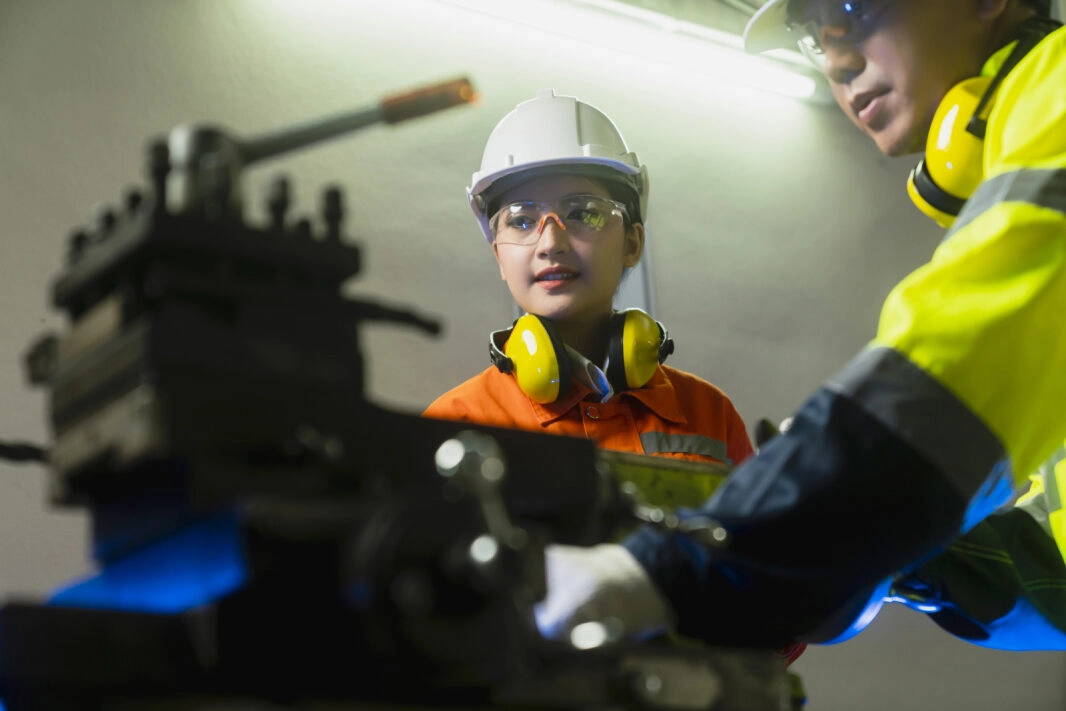Mapúa-Laguna Institute of Aviation (MIA)

Bachelor of Science in
Aeronautical Engineering
B.S. Aeronautical Engineering
Program Overview
The B.S. Aeronautical Engineering program of Mapúa Malayan Colleges Laguna offers students a comprehensive education in the field of aeronautics. This program is designed to equip students with the knowledge and practical skills required to excel in the dynamic and innovative world of aviation.
Partnership with Leading Industry Companies
We take pride in our strategic partnerships with prominent industry players, including:
- Singapore Airline Engineering Philippines: Providing students with invaluable insights into aircraft maintenance and engineering processes through hands-on experiences.
- LufthansaTeknik Philippines: Offering students access to world-class maintenance and repair practices, enhancing their technical expertise.
- Aviation Partnership Philippines Corporation: Facilitating internships and co-op opportunities to bridge the gap between theory and real-world application.
- Sunlight Air: Creating pathways for students to explore the dynamics of air travel and aviation operations.
- Air Swift: Allowing students to understand the nuances of regional and commercial aviation through practical exposure.
- Airbus Philippines: Offering access to cutting-edge resources and insights from one of the world’s leading aerospace corporations.
Key Program Features
- One-on-One Aircraft Simulator Training: Students will have the opportunity to train on advanced aircraft simulators, providing hands-on experience with various aircraft models, flight conditions, and emergency situations.
- Cabin Simulator Training with Actual Emergency Slide Training: In-depth training in cabin operations and emergency procedures, including hands-on practice with emergency slide deployment, enhancing safety and preparedness.
- VR Training through the Use of Oculus VR Goggles: Cutting-edge technology will be integrated into the curriculum, offering virtual reality training experiences that simulate real-world aviation scenarios and systems.
- Composite Training: Comprehensive knowledge and practical skills related to the design, manufacturing, and maintenance of composite materials used in aircraft construction.
- FLUX Classes: Flexible and innovative hybrid learning environments will be offered, combining traditional classroom instruction with online resources to accommodate the diverse needs of students, making education accessible and engaging.
Career Opportunities
Upon completing the B.S. Aeronautical Engineering program at Mapúa MCL, graduates will be well-prepared for a range of exciting career opportunities in the aerospace industry, including aircraft design and manufacturing, maintenance and repair, aviation management, and more. With industry partnerships and advanced training, our students are poised to become leaders in the field, shaping the future of aviation.
Frequently Asked Questions
Got Questions and Interested to become one of Mapúa MCL’s aviation pioneers? Access the B.S. Aeronautical Engineering program’s Frequently Asked Questions for more information!

Bachelor of Science in
Aeronautical Engineering
B.S. Architecture
Program Description
The professional undergraduate program is designed to provide an exceptional college education as well as comprehensive preparation for entry into a competitive and challenging career. Studies in architecture and other basic disciplines are undertaken in parallel throughout the five-year program. The curriculum is designed to develop proficiency in design and conceptualization, enhance skills to communicate ideas through models and graphics, and to gain competence in the artistic, practical and technical aspects of architecture. The program integrates both theoretical and practical approaches to the study with emphasis on the prime development of the students’ creative and critical thinking skills.
Aside from the essential design, planning, structural conceptualization courses, the curriculum also includes core courses in the sciences, ethics and humanities. These are necessary in appreciating the basic philosophy and concepts of the multi-dimensional aspects of architecture. Computer-aided courses in drafting and design are provided not only to immerse the students in the design culture but also to develop in them the artistic skills and technical competencies in using state-of-the-art technologies. In its aim to infuse that high sense of intellectual capacity to seek for the truth, experience new fields and endeavor to enhance quality of life, the program also includes green building principles, sustainable design concepts, research methods and thesis as part of its curriculum requirement. Correlation courses are essential to link the students to the real world and appreciate the realization of the profession.
Educational Objectives
- Ensure mastery of comprehensive architectural knowledge, both in theory and practice, and proficiency of skills by the graduates necessary in the global practice of architecture;
- Promote academic freedom and congenial atmosphere to develop architectural practitioners that could initiate and conduct architectural research and development for the advancement of the profession;
- Infuse a high sense of standard of professional ethics, values, attitudes and sense of responsibility;
- Promote self-managed learning to develop the student’s ability and capacity to analyze facts, to think critically and to express ideas effectively;
- Impart appreciation of the basic philosophy and the fundamental principles of architecture and understanding of the direct relationship between man and his environment in the context of ecological balance and sustainable development; and
- Engender the importance of history and culture in preservation and promotion of the architectural heritage of the country.
Student Outcomes
Graduates of the Bachelor of Science in Architecture program are expected to demonstrate:
- An ability to apply knowledge of arts, science, and architectural design;
- An ability to design and conduct critical analysis and interpret data;
- An ability to do architectural design to meet desired needs within realistic constraints such as economic, environmental, social, political, ethical, health and safety and sustainability;
- An ability to function on multi-disciplinary teams;
- An ability to identify, formulate, and solve architectural problems;
- An understanding of professional and ethical responsibility;
- An ability to communicate effectively;
- The broad education necessary to understand the impact of architectural solutions in a global, economic , environmental, and societal context;
- A recognition of the need for, and an ability to engage in life-long learning;
- A knowledge of contemporary issues; and
- An ability to use the techniques, skills and modern tools necessary for architectural practice.

Bachelor of Science in
Aviation Management Major
in Flights Operation and Dispatch
B.S. Chemical Engineering
Program Description
The Bachelor of Science in Chemical Engineering program provides an opportunity for developing skills, knowledge, and competencies not only in basic engineering but also in areas related to chemical industries such as in the production of chemicals, drugs, food, materials, cement, energy, and other consumer products. The program is based on the application of mathematics, chemistry, physics, material science, and economics. Computer applications are vital to the program.
Educational Objectives
- Graduates of chemical engineering program will have the technical skills and professional qualifications to become competent engineers who can support the industry, academe, or government.
- Graduates of chemical engineering program will be collaborators and innovators in the field, leading or participating in efforts to address social, technical, ethical, and business challenges.
- Graduates of the chemical engineering program will be engaged in life-long learning and professional development.
Student Outcomes
Graduates of the Bachelor of Science in Chemical Engineering program are expected to demonstrate:
- Apply knowledge of mathematics, natural science, engineering fundamentals and an engineering specialization to the solution of complex engineering problems.
- Conduct investigations of complex engineering problems using research-based knowledge and research methods including design of experiments, analysis and interpretation of data, and synthesis of information to provide valid conclusions.
- Design solutions for complex engineering problems and design systems, components or processes that meet specified needs with appropriate consideration for public health and safety, cultural, societal, and environmental considerations.
- Function effectively as an individual, and as a member or leader in diverse teams and in multi-disciplinary settings.
- Identify, formulate, research literature and analyze complex engineering problems reaching substantiated conclusions using first principles of mathematics, natural sciences and engineering sciences.
- Apply ethical principles and commit to professional ethics and responsibilities and norms of engineering practice.
- Communicate effectively on complex engineering activities with the engineering community and with society at large, such as being able to comprehend and write effective reports and design documentation, make effective presentations, and give and receive clear instructions.
- Understand and evaluate the sustainability and impact of professional engineering work in the solution of complex engineering problems in societal and environmental context.
- Recognize the need for, and have the preparation and ability to engage in independent and life-long learning in the broadest context of technological change.
- Apply reasoning informed by contextual knowledge to assess societal, health, safety, legal and cultural issues and the consequent responsibilities relevant to professional engineering practice and solutions to complex engineering problems.
- Create, select and apply appropriate techniques, resources, and modern engineering and IT tools, including prediction and modelling, to complex engineering problems with an understanding of the limitations.
- Demonstrate knowledge and understanding of engineering management principles and economic decision-making and apply these to one’s own work, as a member and leader in a team, to manage projects and in multidisciplinary environments.

Bachelor of Science in
Aviation Management Major in Air Traffic Control
B.S. Civil Engineering
Program Description
The Bachelor of Science in Civil Engineering program aims to provide the highest quality, broad-based technical, scientific, and liberal education to enable students to qualify for graduate or advanced education and professional work in a wide range of civil engineering activities.
The program is a balanced learning experience covering geotechnical engineering, structural engineering, transportation and traffic engineering, water resources engineering, environmental engineering, construction engineering and management, and project planning and administration. The program’s thrust is to create and maintain an educational environment that promotes diverse skills and practical applications designed to prepare students for their entry into the profession and to foster in them the need to observe ethical standards.
Educational Objectives
- Graduates of the Bachelor of Science in Civil Engineering program are envisioned to:
- Have the technical skills and professional qualifications to become competent engineers who can support the industry, academe, or government.
- Be collaborators and innovators in the field, leading or participating in efforts to address social, technical, ethical, and business challenges.
- Be engaged in life-long learning and professional development.
Student Outcomes
Graduates of the Civil Engineering program should have the:
- Apply knowledge of mathematics, natural science, engineering fundamentals and an engineering specialization to the solution of complex engineering problems.
- Conduct investigations of complex engineering problems using research-based knowledge and research methods including design of experiments, analysis and interpretation of data, and synthesis of information to provide valid conclusions.
- Design solutions for complex engineering problems and design systems, components or processes that meet specified needs with appropriate consideration for public health and safety, cultural, societal, and environmental considerations.
- Function effectively as an individual, and as a member or leader in diverse teams and in multi-disciplinary settings.
- Identify, formulate, research literature and analyze complex engineering problems reaching substantiated conclusions using first principles of mathematics, natural sciences and engineering sciences.
- Apply ethical principles and commit to professional ethics and responsibilities and norms of engineering practice.
- Communicate effectively on complex engineering activities with the engineering community and with society at large, such as being able to comprehend and write effective reports and design documentation, make effective presentations, and give and receive clear instructions.
- Understand and evaluate the sustainability and impact of professional engineering work in the solution of complex engineering problems in societal and environmental context.
- Recognize the need for, and have the preparation and ability to engage in independent and life-long learning in the broadest context of technological change.
- Apply reasoning informed by contextual knowledge to assess societal, health, safety, legal and cultural issues and the consequent responsibilities relevant to professional engineering practice and solutions to complex engineering problems.
- Create, select and apply appropriate techniques, resources, and modern engineering and IT tools, including prediction and modelling, to complex engineering problems with an understanding of the limitations.
- Demonstrate knowledge and understanding of engineering management principles and economic decision-making and apply these to one’s own work, as a member and leader in a team, to manage projects and in multidisciplinary environments.
Got Questions?

Industry Partners










